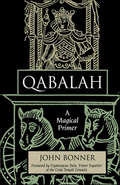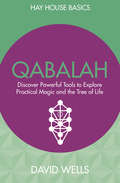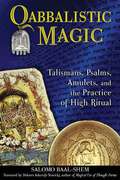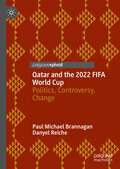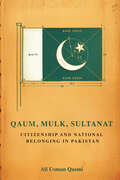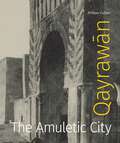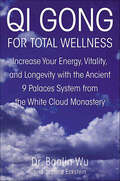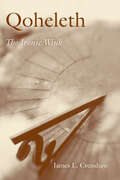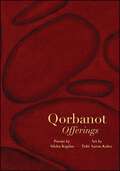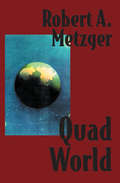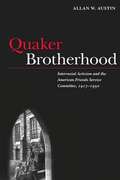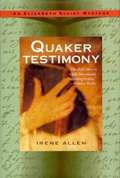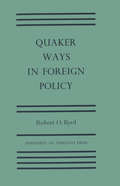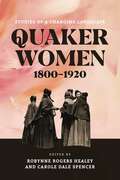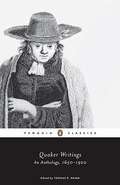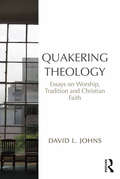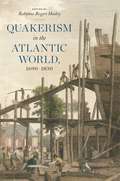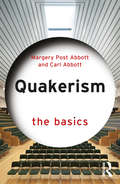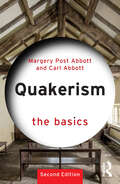- Table View
- List View
Qabalah for Wiccans: Ceremonial Magic on the Pagan Path
by Jack ChanekExplore the Tree of Life from a Pagan Point of ViewYou don't have to shy away from Qabalah anymore—this book makes it easy to use ceremonial magic and incorporate its symbolism into your Wiccan rituals and workings. Join Jack Chanek on an exploration of Hermetic Qabalah and learn how its concepts can be interwoven with the essential elements of Wicca.Featuring an abundance of journal prompts, exercises, and correspondences, Qabalah for Wiccans is the ideal resource for understanding Qabalah as a Pagan practitioner. You'll uncover Qabalistic connections to Wiccan theology, ascend the Tree of Life through meditation and ritual, and explore the Tree's ten Sephiroth using the four elements, tarot, and more. Revealing many similarities between the two practices, this remarkable book shows you how Qabalah works and why it matters to your Wiccan path.Includes a foreword by Deborah Lipp, author of Magical Power for Beginners
Qabalah: A Magical Primer
by John BonnerWhile it began as a mystical interpretation of Jewish scriptural texts, today Qabalah is much more. As John Bonner writes in his introduction, "Qabalah is a metaphysical philosophy, or rather a theosophy, that sets out to answer a series of vital questions regarding the nature of God, His creation, and the place of man in His divine plan." It is a living, growing system of personal development. In addition, much of contemporary Western magick is founded on the work of the Hermetic Order of the Golden Dawn, which based its ritual and teachings firmly in Qabalah. This scholarly introduction explores the mysteries of Qabalah through the symbolism of the Tree of Life and its four distinct elements: the three Pillars of Manifestation, the ten Holy Sephiroth, the Paths that run to and from the Sephiroth, and the Veils. For each Sephirah, Bonner provides detailed information on magical, astrological, and tarot correspondences - as well as how different religious traditions relate to the concepts contained in each.
Qabalah: Discover Powerful Tools to Explore Practical Magic and the Tree of Life (Hay House Basics Ser.)
by David WellsDiscover Qabalah, a Western non-religious mystic tradition containing a body of magical knowledge and practices to help you embrace your higher self. In this book, you will learn:• The role of the Tree of Life – the central organizational system of Qabalah• The meaning of each Sephira, or sphere, on the Tree• An exercise and meditation for each Sephira• How to work with and understand the symbolism of each Sephira, from Gods and Goddesses to Crystals• How to increase the energy for your meditations and create a personal sigil, or symbol, to represent your highest values• How to use Qabalistic prayer and work with the four great Archangels for daily support and protection ... and much more!
Qabbalistic Magic: Talismans, Psalms, Amulets, and the Practice of High Ritual
by Dolores Ashcroft-Nowicki Salomo Baal-ShemA comprehensive guide to practicing the magic of the Qabbalah • Spells for everyday problems related to health, love, prosperity, and protection • Rituals for advanced high-level magic, such as invocation of angelic powers or spiritual vision • Explains how to make and design talismans, amulets, and magic bowls, including harnessing the power of Hebrew letters in their designs • Details the magical uses of 150 psalms The Qabbalah--the Jewish esoteric tradition--is richly woven with magical practices, from amulets and magic bowls to invocations and magical use of psalms. In this comprehensive and practical guide to Qabbalistic magic, Salomo Baal-Shem explains how to authentically perform rituals from the Qabbalistic tradition. The spells and rituals included range from basic “everyday” magic for health, prosperity, love, protection, and prophetic dreams to advanced high-level magic such as invoking the highest angelic powers or creating an astral life-form, or Golem. Revealing the occult teachings of the 4th-century Book of the Mysteries, the magical uses of 150 psalms, and how to harness the power of Hebrew letters in talisman designs, the author also shows you how to contact the Maggid, or Divine inner teacher, or attain the spiritual vision of the Merkabah. A thoroughly accessible guide to the magic of the Qabbalah, this book also covers the underlying spiritual principles and history of these powerful magical practices.
Qasam Us Waqt Ki: क़सम इस वक्त की
by Abu Yahyaपाठकों की सेवा में "क़सम उस वक़्त की" के नाम से यह नॉविल प्रस्तुत है। अल्लाह के रहमो करम से इस किताब में खुदा के होने और क़यामत के वजूद को साबित किया गया है और ऐसे साबित किया गया है कि इन्कार की कोई गुंजाइश बाकि नहीं रहती। ज़ाहिर है यह काम एक चमत्कार है जो किसी इन्सान के वश की बात नहीं, लेकिन अल्हम्दुलिल्लाह यह काम काएनात के रब ने अपनी किताब कुरआन मजीद में खुद ही कर रखा है। इस नॉवेल में कुरआन मजीद का यही चमत्कार पेश करने की कोशिश की गई है जो आखरी हद तक सच्चाई को साबित कर देता है। इस मामूली बन्दे के अनुसार कुरआन करीम का यही वो चमत्कार है जो दुनिया रहने तक हर इंसान पर सच्चाई को आखरी हद तक साबित कर देता है। हमारे विद्वान इस चमत्कार को समझते और अपनी किताबों में लिखते रहते हैं लेकिन ज़्यादा तर आम मुसलमान इसको आसानी से समझ नहीं पाते। मगर हर मुसलमान की यह जिम्मेदारी है कि वो इस चमत्कार को समझे और दूसरों को समझाए। इंशा अल्लाह यह नॉविल इस काम को एक कहानी के रूप में आसान करने में बहुत सहायक साबित होगा।
Qatar and the 2022 FIFA World Cup: Politics, Controversy, Change
by Danyel Reiche Paul Michael BrannaganThis book offers the first, full academic analysis of the Qatar 2022 FIFA World Cup. Adopting an international relations perspective, the authors critically interrogate the politics and controversy that has surrounded arguably the most controversial sports event ever. In doing so, this text offers up an imperative examination of Qatar’s desired objectives through their investment in global sport and sports events, as well as provides readers with an academic explanation on why major event hosts – such as Qatar – receive so much international scrutiny in the pre-event stage of the event hosting process. On the back of this international scrutiny, this text also provides the first full analysis on how such negative scrutiny has forced Qatar to implement various social-political changes at home.
Qaum, Mulk, Sultanat: Citizenship and National Belonging in Pakistan (South Asia in Motion)
by Ali Usman QasmiAfter the trauma of mass violence and massive population movements around the partition of India and Pakistan in 1947, both new nation states faced the enormous challenge of creating new national narratives, symbols, and histories, as well as a new framework for their political life. While leadership in India claimed the anti-colonial movement, Gandhi, and a civilizational legacy in the subcontinent, the new political elite in Pakistan were faced with a more complex task: to carve out a separate and distinct Muslim history and political tradition from a millennium long history of cultural and religious interaction, mixing, and coexistence. Drawing on a rich archive of diverse sources, Ali Qasmi traces the complex development of ideas of citizenship and national belonging in the postcolonial Muslim state, offering a nuanced and sweeping history of the country's formative period. Qasmi paints a rich picture of the long, arduous, and often conflict-ridden process of writing a democratic constitution of Pakistan, while simultaneously narrating the invention of a range of new rituals of state—such as the exact color of the flag, the precise date of birth of the national poet of Pakistan, and the observation of Eid as a "national festival"—providing an illuminating analysis of the practices of being Pakistani, and a new portrait of Muslim history in the subcontinent.
Qayrawān: The Amuletic City (Refiguring Modernism)
by William GalloisIn the last years of the nineteenth century, the Tunisian city of Qayrawān suddenly found itself covered in murals. Concentrated on and around the city’s Great Mosque, these monumental artworks were only visible for about fifty years, from the 1880s through the 1930s. This book investigates the fascinating history of who created these outdoor paintings and why.Using visual archaeological methods, William Gallois reconstructs the visual history of these works and vividly brings them back to life. He locates pictorial records of the murals from the backdrops of photographs, postcards, and other forms of European ephemera. In Qayrawān, he identifies a form of religious painting that transposed traditional aesthetic forms such as house decoration, embroidery, and tattooing—which lay exclusively within the domains of women—onto the body of a conquered city. Gallois argues that these works were created by women as a form of “emergency art,” intended to offer amuletic protection for the community, and demonstrates how they differ markedly from “classical” Islamic antecedents and modern modes of Arab cultural production in the Middle East and North Africa.Based on extensive archival research, this study is both a record of a unique moment in the history of art and a challenge to rethink the spiritual force and agency of a group of anonymous female artists whose paintings aspired to help save the world at a time of great peril. It will be welcomed by scholars of art history, Islamic studies, Middle East studies, and the history of magic.
Qi Gong for Total Wellness: Increase Your Energy, Vitality, and Longevity with the Ancient 9 Palaces System from the White Cloud Monastery
by Baolin Wu Jessica EcksteinQi Gong for Total Wellness is a clear, illustrated guide to Qi Gong, the ancient self-healing art that combines movement, meditation, and visualization to boost energy and improve health. Author Baolin Wu specializes in Nine Palaces Solar Qi Gong which works with the energy of the son, and trains practioners to expel toxins and intake healthy qi through the nine openings--palaces-- of the body.This introduction to the concepts of Qi Gong and contains exercises and methods pertaining to each part of the body, with clear instructions how to accurately apply the methods of Solar Qi Gong to increase physical and mental health using this ancient art.
Qoheleth: The Ironic Wink (Studies on Personalities of the Old Testament)
by James L. Crenshaw“In this substantive yet accessible volume, Crenshaw brings to life the Bible’s strangest sage . . . A superb introduction for students and scholars alike.” —William P. Brown, William Marcellus McPheeters Professor of Old Testament at Columbia Theological SeminaryRarely does a biblical book evoke admiration from a Nobel laureate in literature, a newspaper columnist, a prize-winning poet, and a popular songwriter. Ecclesiastes has done that, and for good reason. Its author, who called himself Qoheleth, stared death in the face and judged all human endeavors to be futile. For Qoheleth observation is the only avenue to understanding; an arbitrarily wrathful and benevolent deity created and rules over the world; and death is unpredictable, absolute, and final. His message is simple: seize the moment, for death awaits.James L. Crenshaw begins by examining the essential mysteries of the book of Ecclesiastes: the speaker’s identity, his emphasis on hidden or contradictory truths, and his argument of the insubstantiality of most things and the ultimate futility of all efforts. Moving from the ancient to the contemporary, Crenshaw again analyzes Qoheleth’s observations about the human condition, this time testing if they can stand up against rational inquiry today. In exploring Qoheleth’s identity, the foundations of his outlook, and his recommendations, Crenshaw engages modern readers in a conversation about one of the most disagreed upon biblical books.In Qoheleth, Crenshaw draws on related literature from the ancient Near East and traces the impact of Qoheleth in both Christian and Jewish traditions, summarizing a lifetime of scholarship on the book of Ecclesiastes. While exploring Ecclesiastes and its enigmatic author, Crenshaw engages scholars and modern interpreters in genuine debate over the lasting relevance of Qoheleth’s teachings and the place of Ecclesiastes in the biblical canon.
Qorbanot: Offerings (SUNY series in Contemporary Jewish Literature and Culture)
by Alisha KaplanA dynamic dialogue of poetry and art that reimagines the ancient, biblical concept of sacrifice.Winner of the 2022 Gerald Lampert Memorial Award presented by the League of Canadian Poets A collaboration between poet Alisha Kaplan and artist Tobi Aaron Kahn, Qorbanot-the Hebrew word for "sacrificial offerings"-explores the concept of sacrifice, offering a new vision of an ancient practice. A dynamic dialogue of text and image, the book is a poetic and visual exegesis on Leviticus, a visceral and psychological exploration of ritual offerings, and a conversation about how notions of sacrifice continue to resonate in the twenty-first century.Both from Holocaust survivor families, Kaplan and Kahn deal extensively with the Holocaust in their work. Here, the modes of poetry and art express the complexity of belief, the reverberations of trauma, and the significance of ritual. In the poems, the speaker, offspring of burnt offerings, searches for meaning in her grandparents' experiences and in the long tradition of Orthodox Judaism in which she was raised. Kahn's paintings on handmade paper, drawn from decades of his career as an artist, have not previously been exhibited or published. They reflect his quest to distill a legacy of trauma and loss into enduring memory.With a foreword by James E. Young and essays by Ezra Cappell, Lori Hope Lefkovitz, and Sasha Pimentel, the book presents new directions for thinking about what sacrifice means in religious, social, and personal contexts, and harkens back to foundational traditions, challenging them in reimagined and artistic ways.
Quad World
by Robert A. MetzgerJohn Smith began that morning a perfectly healthy man, but before he knows it time freezes during his morning staff meeting and he thinks he's dying. Has his body stopped or has everything around him? When the clock begins to click again, he is trapped in a parallel universe, where he is "greeted" by Joan of Arc and Robin Hood. Trapped in a world inhabited by only Quads and survivors of biological warfare, John becomes entangled in a battle between God or the Devil, Elvis and Napoleon. The fate of the world rests on John putting together the pieces of a cosmic puzzle before everyone in Quad world is forever confined to Hell. Can he discover the secrets of Quad in time?
Quaker Brotherhood: Interracial Activism and the American Friends Service Committee, 1917-1950
by Allan W. AustinThe Religious Society of Friends and its service organization, the American Friends Service Committee (AFSC) have long been known for their peace and justice activism. The abolitionist work of Friends during the antebellum era has been well documented, and their contemporary anti-war and anti-racism work is familiar to activists around the world. Quaker Brotherhood is the first extensive study of the AFSC's interracial activism in the first half of the twentieth century, filling a major gap in scholarship on the Quakers' race relations work from the AFSC's founding in 1917 to the beginnings of the civil rights movement in the early 1950s. Allan W. Austin tracks the evolution of key AFSC projects such as the Interracial Section and the American Interracial Peace Committee, which demonstrate the tentativeness of the Friends' activism in the 1920s, as well as efforts in the 1930s to make scholarly ideas and activist work more theologically relevant for Friends. Documenting the AFSC's efforts to help European and Japanese American refugees during World War II, Austin shows that by 1950, Quakers in the AFSC had honed a distinctly Friendly approach to interracial relations that combined scholarly understandings of race with their religious views. In tracing the transformation of one of the most influential social activist groups in the United States over the first half of the twentieth century, Quaker Brotherhood presents Friends in a thoughtful, thorough, and even-handed manner. Austin portrays the history of the AFSC and race--highlighting the organization's boldness in some aspects and its timidity in others--as an ongoing struggle that provides a foundation for understanding how shared agency might function in an imperfect and often racist world. Highlighting the complicated and sometimes controversial connections between Quakers and race during this era, Austin uncovers important aspects of the history of Friends, pacifism, feminism, American religion, immigration, ethnicity, and the early roots of multiculturalism.
Quaker Silence (Elizabeth Elliot Quaker Mystery #1)
by Irene Allen[from the book jacket:] "What happens when murder strikes at the heart of the nonviolent Quaker community? Here is the debut of a refreshing and beguiling mystery series with a new sleuth who has a brilliant deductive style that's all her own. Elizabeth Elliot is a widow of some years and considerable moral authority. Since girlhood she has drawn inner strength from her beloved Quaker worship and just recently has been elected to serve as clerk of the Quaker Meeting in Harvard Square in Cambridge, Massachusetts. Elizabeth's worries about her ability to carry out the everyday duties of the job--leading the congregation in prayerful meditation, balancing the budget, etc.--are put aside, though, when she receives the shocking news that a prominent member of the meeting has been found murdered in his garden! The victim is John Hoffman, a wealthy businessman near retirement who is just preparing, he has announced to the entire congregation, to alter his will. Obviously many people would rather he did not leave most of his estate to charity, yet the police focus their investigation on Tim, a young homeless man who attends the meeting and whom John Hoffman occasionally hired to work in his garden. Not surprisingly, Tim is unable to supply a convincing alibi, yet Elizabeth is certain that he is innocent. She rises to the occasion, standing up to the police, who are eager to convict an indigent man, and doing some wildly inventive and daring detective work that makes surprising use of Quaker practices and philosophy. Before she finally confronts the killer, Elizabeth will sift through a myriad of red herrings and seemingly unrelated clues and secrets. For within the blessed "Quaker silence" is greed, forbidden love, and vengeful anger struggling to find a voice. Mixing timeless philosophy with contemporary concerns, Irene Allen's Quaker Silence marks the beginning of an outstanding mystery series."
Quaker Summer
by Lisa SamsonSometimes you have to go a little bit crazy to discover the life you were meant to live. Heather Curridge is coming unhinged. And people are starting to notice. What's wrong with a woman who has everything--a mansion on a lake, a loving son, a heart-surgeon husband--yet still feels miserable inside? When Heather spends the summer with two ancient Quaker sisters and a crusty nun running a downtown homeless shelter, she finds herself at a crossroads. Life turns upside down for Heather in a Quaker Summer."One of the most powerful voices in Christian fiction, Samson delivers ...a staggering examination of the Christian conscience." -Publishers Weekly
Quaker Testimony (Elizabeth Elliot Quaker Mystery #3)
by Irene Allen[from the dust jacket:] "Widow Elizabeth Elliot lives a simple life in the bustling town of Cambridge, Massachusetts. As Clerk of the Quaker Meeting, she takes care of the daily business of running the Meeting and leads the congregation in prayerful meditation. She also serves as a moral authority. So when murder strikes at the heart of the nonviolent Quaker community, Elizabeth becomes a delightfully unconventional sleuth. Hope and Sheldon Laughton, a young Quaker couple, refuse to pay war taxes. The IRS plans to repossess the Laughton house due to their debts, so Elizabeth goes to the house to offer moral support. She is horrified to discover Hope murdered, lying in a pool of blood on the kitchen floor. The crime threatens to tear the community apart when suspicion falls upon a number of Quakers. Could the killer be Otto, a young Quaker and dear friend of the Laughtons, who also happened to have had a not-so-secret crush on Hope? Or could it be Sheldon himself, due to unseen strains in their marriage? Even Elizabeth is a suspect, and she is forced to spend a night in jail! Determined to discover the identity of the murderer, Elizabeth combines her quiet wisdom with perseverance as she makes her way to a shocking, disturbing discovery."
Quaker Ways in Foreign Policy
by Robert O. ByrdFor three hundred years the Society of Friends, or Quakers, has been forwarding to governments recommendations on foreign policy, and it has often been in the vanguard of thought in its social and political views. In this study, Dr. Byrd brings together and states carefully and accurately those beliefs, principles, attitudes, and practices which have been fundamental to the Quaker approach. He illustrates and verifies his statement by an analytical Friends acting in official and semi-official capacities, which relate to foreign policy and international relations.Dr. Byrd's systematic exposition of the modern Quaker's theory of international relations offers a stimulating antidote to the realpolitik school of thought. His account of the Quaker interest in international affairs from 1647 to the present underlines for the diplomatic historian the role of morality in diplomacy, the influence of public opinion upon policy, and the part played by groups like Friends in shaping public attitudes. As Hans J. Morgenthau comments in his Foreword, "In a world which uses Christian ethics for un-Christian ends it is indeed moving to follow the historical trail of a Christian sect which seeks to transform itself and political society in the image of Christian teaching. . . . In their convictions, achievements, and sufferings the Quakers bear witness to the teachings of Christianity; in their failures they bear witness to the insuperable stubbornness of the human condition. . . . not the least of the merits of Professor Byrd's book is his ability to convey through the movement of his mind and pen something of that moving quality which makes the Quaker approach to foreign policy, if nothing else, a noble experiment in Christian living."
Quaker Witness (Elizabeth Elliot Quaker Mystery #2)
by Irene Allen[from the dust jacket:] "The Clerk of a Quaker Meetinghouse has many important duties, ranging from presiding over interminable business meetings and answering difficult mail to helping keep the budget in balance. For Elizabeth Elliot, a lifelong member of the Quaker Meeting in Cambridge, being Clerk also means solving a murder or two." "Elizabeth is an intelligent and compassionate widow whose life once revolved around simple religious work and such domestic tasks as baking bread. These days, however, she finds herself developing new and somewhat unusual talents - including surreptitiously eavesdropping in hallways, interrogating graduate students about poisonous gas, and rooting out a ruthless killer - as the mild-mannered Quaker feels increasingly called to the grim avocation of crime-solving." "First introduced to us by Irene Allen in Quaker Silence, the capable Clerk has already proven that no obstacle that stands in the way of truth is too daunting for her to overcome. Now that she is familiar with murder investigations, not even mighty Harvard University, the Meeting's powerful neighbor just up Brattle Street, can intimidate her." "When an eminent paleontologist is found murdered in his lab at Harvard, suspicion automatically falls on a young graduate student, the professor's only female advisee, who has, coincidentally, just filed sexual harassment charges against him. Not surprisingly, the university is eager to handle both the murder and the troublesome student quietly and quickly, the matter as an open-and-shut case. Only Elizabeth who befriended the accused just before the murder, is convinced of the young woman's innocence." "Combining wisdom and patience with uncanny perception, Elizabeth carefully threads her way through a web of clues and contradictions to arrive at several disturbing conclusions that prove greed and corruption can thrive anywhere, even in the world of pure scientific research. Lovers of intelligent mysteries will thrill to this singular heroine and her subtle but effective ways of triumphing over evil. With Quaker Witness, Irene Allen once again offers compelling testimony to the possibility of decency and integrity in today's complex world." Bookshare has books one and three in the Elizabeth Elliot series: Quaker Silence and Quaker Testimony.
Quaker Women, 1800–1920: Studies of a Changing Landscape (The New History of Quakerism)
by Robynne Rogers Healey and Carole Dale SpencerThis collection investigates the world of nineteenth-century Quaker women, bringing to light the issues and challenges Quaker women experienced and the dynamic ways in which they were active agents of social change, cultural contestation, and gender transgression in the nineteenth century.New research illuminates the complexities of Quaker testimonies of equality, slavery, and peace and how they were informed by questions of gender, race, ethnicity, and culture. The essays in this volume challenge the view that Quaker women were always treated equally with men and that people of color were welcomed into white Quaker activities. The contributors explore how diverse groups of Quaker women navigated the intersection of their theological positions and social conventions, asking how they challenged and supported traditional ideals of gender, race, and class. In doing so, this volume highlights the complexity of nineteenth-century Quakerism and the ways Quaker women put their faith to both expansive and limiting ends. Reaching beyond existing national studies focused solely on white American or British Quaker women, this interdisciplinary volume presents the most current research, providing a necessary and foundational resource for scholars, libraries, and universities.In addition to the editors, the contributors to this volume include Joan Allen, Richard C. Allen, Stephen W. Angell, Jennifer M. Buck, Nancy Jiwon Cho, Isabelle Cosgrave, Thomas D. Hamm, Julie L. Holcomb, Anna Vaughan Kett, Emma Lapsansky-Werner, Linda Palfreeman, Hannah Rumball, and Janet Scott.
Quaker Writings
by Thomas D. HammAn illuminating collection of work by members of the Religious Society of Friends. Covering nearly three centuries of religious development, this comprehensive anthology brings together writings from prominent Friends that illustrate the development of Quakerism, show the nature of Quaker spiritual life, discuss Quaker contributions to European and American civilization, and introduce the diverse community of Friends, some of whom are little remembered even among Quakers today. It gives a balanced overview of Quaker history, spanning the globe from its origins to missionary work, and explores daily life, beliefs, perspectives, movements within the community, and activism throughout the world. It is an exceptional contribution to contemporary understanding of religious thought.
Quakering Theology: Essays on Worship, Tradition and Christian Faith
by David L. JohnsQuakers exist neither for themselves nor by themselves alone. Therefore, they ought not to construct Quaker theologies but rather quaker (verb) theology-to add their fingerprints to the larger conversation. David Johns contributes to a Quaker way of thinking theologically but also invites others to think through their denominational identities into a more expansive and ecumenical space. Placing contemporary Quaker thought in conversation with the wider theological tradition, Johns shows that Quakers have something important to contribute to the wider Christian family and he demonstrates how other groups may enter this conversation as well. Some themes explored may not spring immediately to mind as ’Quaker themes’-the saints, C.S. Lewis, sacraments, ritual, and Shakespeare-but Johns argues these are precisely the kind of issues that require Quaker fingerprints-that require quakering.
Quakerism in the Atlantic World, 1690–1830 (The New History of Quakerism #3)
by Robynne Rogers HealeyThis third installment in the New History of Quakerism series is a comprehensive assessment of transatlantic Quakerism across the long eighteenth century, a period during which Quakers became increasingly sectarian even as they expanded their engagement with politics, trade, industry, and science. The contributors to this volume interrogate and deconstruct this paradox, complicating traditional interpretations of what has been termed "Quietist Quakerism."Examining the period following the Toleration Act in England of 1689 through the Hicksite-Orthodox Separation in North America, this work situates Quakers in the eighteenth-century British Atlantic world. Three thematic sections—exploring unique Quaker testimonies and practices; tensions between Quakerism in community and Quakerism in the world; and expressions of Quakerism around the Atlantic world—broaden geographic understandings of the Quaker Atlantic experience to determine how local events shaped expressions of Quakerism. The authors challenge oversimplified interpretations of Quaker practices and reveal a complex Quaker world, one in which prescription and practice were more often negotiated than dictated, even after the mid-eighteenth-century "reformation" and tightening of the Discipline on both sides of the Atlantic. Accessible and well-researched, Quakerism in the Atlantic World, 1690-1830, provides fresh insights and raises new questions about an understudied period of Quaker history.In addition to the editor, the contributors to this volume include Richard C. Allen, Erin Bell, Erica Canela, Elizabeth Cazden, Andrew Fincham, Sydney Harker, Rosalind Johnson, Emma Lapsansky-Werner, Jon Mitchell, and Geoffrey Plank.
Quakerism in the Atlantic World, 1690–1830 (The New History of Quakerism)
by Robynne Rogers HealeyThis third installment in the New History of Quakerism series is a comprehensive assessment of transatlantic Quakerism across the long eighteenth century, a period during which Quakers became increasingly sectarian even as they expanded their engagement with politics, trade, industry, and science. The contributors to this volume interrogate and deconstruct this paradox, complicating traditional interpretations of what has been termed “Quietist Quakerism.”Examining the period following the Toleration Act in England of 1689 through the Hicksite-Orthodox Separation in North America, this work situates Quakers in the eighteenth-century British Atlantic world. Three thematic sections—exploring unique Quaker testimonies and practices; tensions between Quakerism in community and Quakerism in the world; and expressions of Quakerism around the Atlantic world—broaden geographic understandings of the Quaker Atlantic experience to determine how local events shaped expressions of Quakerism. The authors challenge oversimplified interpretations of Quaker practices and reveal a complex Quaker world, one in which prescription and practice were more often negotiated than dictated, even after the mid-eighteenth-century “reformation” and tightening of the Discipline on both sides of the Atlantic. Accessible and well-researched, Quakerism in the Atlantic World, 1690-1830, provides fresh insights and raises new questions about an understudied period of Quaker history.In addition to the editor, the contributors to this volume include Richard C. Allen, Erin Bell, Erica Canela, Elizabeth Cazden, Andrew Fincham, Sydney Harker, Rosalind Johnson, Emma Lapsansky-Werner, Jon Mitchell, and Geoffrey Plank.
Quakerism: The Basics (The Basics)
by Carl Abbott Margery Post AbbottQuakerism: The Basics is an accessible and engaging introduction to the history and diverse approaches and ideas associated with the Religious Society of Friends. This small religion incorporates a wide geographic spread and varied beliefs that range from evangelical Christians to non-theists. Topics covered include: Quaker values in action The first generations of Quakerism Quakerism in the eighteenth and nineteenth centuries Belief and activism Worship and practice Quakerism around the world The future of Quakerism. With helpful features including suggested readings, timelines, a glossary, and a guide to Quakers in fiction, this book is an ideal starting point for students and scholars approaching Quakerism for the first time as well as those interested in deepening their understanding.
Quakerism: The Basics (The Basics)
by Carl Abbott Margery Post AbbottQuakerism: The Basics introduces a vibrant twenty-first-century religion, tracing the evolution of the Religious Society of Friends from its origins in seventeenth-century England to a worldwide religion, balancing discussion of Quaker history, evolving beliefs and practices, and contemporary social action. An accessible and engaging introduction to the history and diverse approaches and ideas associated with the Religious Society of Friends, this book treats Quakerism as a global religion with wide geographic reach and varied beliefs that range from evangelical Christianity to non-theism, including: Quaker values in action Quaker history, worship, and practice Quakerism in different regions of the world The future of Quakerism This thoroughly revised second edition now includes information on Quakers in Africa, Friends active engagement with electoral politics, electronic communication and online meetings, and a new appendix on Quakers in film. Quakerism: The Basics is suitable for secondary and university courses on Quakerism and comparative religion, with features including suggested readings, timelines, boxed features on special topics, a glossary, and guides to Quakers in fiction and on film. This book is also intended for individuals new to Quakers, for meeting and church study groups, and for those who want to refresh their understanding of Quakerism.

